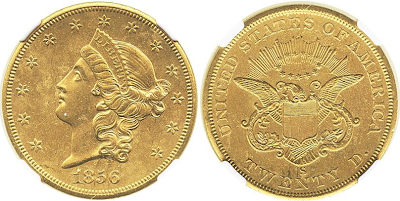Written by the TreasureGuide for the exclusive use of treasurebeachesreport.blogspot.com.
 |
| Nice Gold Coin Found North of Fort Old Pierce Inlet Part of Fort Capron Payroll Treasure. Currently listed for sale in the current Sedwick treasure auction. |
I've told that story before, so won't go into all the details again.
Here is the description of that coin from the current Sedwick Coins Treasure Auction listing.
USA (San Francisco mint), $20 (double eagle) coronet Liberty, 1856-S, encapsulated NGC UNC details / sea salvaged, from the "Fort Capron treasure" (1857). KM-74.1. Typically grainy but with underlying luster and hint of toning. From the "Fort Capron treasure" of 1857 (AKA "Gordy-Ashley gold").
Nice to see another fine local find.
It's surprising how you can stumble on some odd bit of information that becomes absolutely fascinating as you discover its relevance and application.
I found a little article about what metals corrode with salt water. Here are two paragraphs from the article with the first sentence giving the answer.
All of them, to a greater or lesser degree, depending on their position in the "Electromotive Series of Metals," also known as the "Galvanic Series of Metals."
This is a list of metals in order from most to least reactive in sea water. If there are two metals near each other in salt water, the one which is the more reactive (a.k.a. "least noble") will corrode, thus protecting the other metal.
The article provides a nice list of metals in order of reactivity.
Right off of the bat I thought of three ways this list provides information that is relevant to a beach detectorist.
Just the other day I was talking a little about the halo effect, a much discussed and disputed topic among detectorists. The theory is that an item that is more reactive will leach more and cause more of a halo effect.
Before I get into that any more though, the article states that all metals corrode to some extent in salt water. I know that people often say that gold does not corrode. I've addressed that before in a post a good while ago.
Gold is a noble metal and won't corrode much, but it will corrode. There are at least two other metals that will corrode less than gold. Can you guess what they might be?
Here are two from the list in the article. Mercury and vanadium.
That wasn't easy, was it?
The article on the halo effect that I read the other day and commented on in this blog, said that only iron creates a halo effect. I would think that since every metal corrodes, every metal would be capable of providing some amount of a halo effect, if indeed, any metal does. That, as I said, is still being debated by many in the detecting hobby.
Just to be clear, we are talking about metals and salt water here.
The article also talks about how different metals are used on ships to help protect or preserve important parts. Less noble metals (metals that corrode more) are used to protect other metallic parts. That has been discussed some in this blog and more in the references that I've provided in the past. For one example, I've discussed how they discovered that copper sheathing caused iron spikes to corrode very quickly.
The same thing explains in part why one item found in the sea might corrode a lot while another similar item made of the same metal might corrode very little. It depends on what the item is close to.
This article will also help you select the most effective metals to use when cleaning items using electrolysis.
Now that I've briefly mentioned some of the ways the article might prove useful, here is the link to the article.
http://wiki.answers.com/Q/What_metal_corrodes_with_salt_water
Good information!
Did you notice how low zinc is on the list? You've undoubtedly seen how quickly salt water causes zinc pennies to corrode.
This article helps to explain a lot of things that you will see on a beach.
I know that some of that material (rocks and sand) is coming from the south, but I've also seen sand being dug from the lagoon around the Fort Pierce inlet.
I'm always interested in where sand is being moved. As you know that is much of what beach detecting is about, especially if you want to find older things.
Usually we have to depend upon Mother Nature to move the sand, but be aware of anytime the sand being moved. It could present an opportunity.
On the Treasure Coast the surf is around 2 - 3 fee this morning with the wind out of the south/southeast. Later today the surf will drop to down around 1 - 2 feet. Combined with the low tides we are getting, that should make it fairly easy to work the swash later today.
Low tide will be around 3:30 PM.
Happy hunting,
TreasureGuide@comcast.net